0 简介
今天学长向大家介绍一个机器视觉的毕设项目
毕业设计项目分享 LSTM股价预测
项目运行效果:
毕业设计 lstm股价预测
项目获取:
https://gitee.com/sinonfin/algorithm-sharing
1 LSTM 神经网络
长短期记忆 (LSTM) 神经网络属于循环神经网络 (RNN) 的一种,特别适合处理和预测与时间序列相关的重要事件。以下面的句子作为一个上下文推测的例子:
“我从小在法国长大,我会说一口流利的??”
由于同一句话前面提到”法国“这个国家,且后面提到“说”这个动作。因此,LSTM便能从”法国“以及”说“这两个长短期记忆中重要的讯号推测出可能性较大的”法语“这个结果。
K线图与此类似,股价是随着时间的流动及重要讯号的出现而做出反应的:
- 在价稳量缩的盘整区间中突然出现一带量突破的大红K,表示股价可能要上涨了
- 在跳空缺口后出现岛状反转,表示股价可能要下跌了
- 在连涨几天的走势突然出现带有长上下影线的十字线,表示股价有反转的可能
LSTM 要做的事情就是找出一段时间区间的K棒当中有没有重要讯号(如带量红K)并学习预测之后股价的走势。
2 LSTM 股价预测实例
数据是以鸿海(2317)从2013年初到2017年底每天的开盘价、收盘价、最高价、最低价、以及成交量等数据。
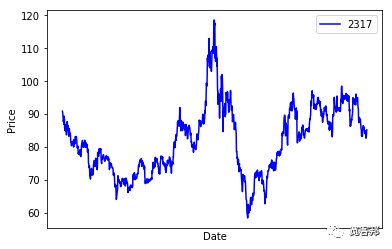
首先将数据写入并存至pandas的DataFrame,另外对可能有N/A的row进行剔除:
数据写入:
import pandas as pd
foxconndf= pd.read_csv('./foxconn_2013-2017.csv', index_col=0)
foxconndf.dropna(how='any',inplace=True)
為了避免原始数据太大或是太小没有统一的范围而导致 LSTM 在训练时难以收敛,我们以一个最小最大零一正规化方法对数据进行修正:
from sklearn import preprocessing
defnormalize(df):
newdf= df.copy()
min_max_scaler = preprocessing.MinMaxScaler()
newdf['open']= min_max_scaler.fit_transform(df.open.values.reshape(-1,1))
newdf['low']= min_max_scaler.fit_transform(df.low.values.reshape(-1,1))
newdf['high']= min_max_scaler.fit_transform(df.high.values.reshape(-1,1))
newdf['volume']= min_max_scaler.fit_transform(df.volume.values.reshape(-1,1))
newdf['close']= min_max_scaler.fit_transform(df.close.values.reshape(-1,1))return newdf
foxconndf_norm= normalize(foxconndf)

然后对数据进行训练集与测试集的切割,另外也定义每一笔数据要有多长的时间框架:
import numpy as np
def data_helper(df, time_frame):
3 数据维度: 开盘价、收盘价、最高价、最低价、成交量, 5维
number_features = len(df.columns)
# 将dataframe 转换为 numpy array
datavalue = df.as_matrix()
result = []
# 若想要观察的 time_frame 為20天, 需要多加一天作为验证答案
for index in range( len(datavalue) - (time_frame+1) ): # 从 datavalue 的第0个跑到倒数第 time_frame+1 个
result.append(datavalue[index: index + (time_frame+1) ]) # 逐笔取出 time_frame+1 个K棒数值做為一笔 instance
result = np.array(result)
number_train = round(0.9 * result.shape[0]) # 取 result 的前90% instance 作为训练数据
x_train = result[:int(number_train), :-1] # 训练数据中, 只取每一个 time_frame 中除了最后一笔的所有数据作为feature
y_train = result[:int(number_train), -1][:,-1] # 训练数据中, 取每一个 time_frame 中最后一笔数据的最后一个数值(收盘价)作为答案
# 测试数据
x_test = result[int(number_train):, :-1]
y_test = result[int(number_train):, -1][:,-1]
# 将数据组成变好看一点
x_train = np.reshape(x_train, (x_train.shape[0], x_train.shape[1], number_features))
x_test = np.reshape(x_test, (x_test.shape[0], x_test.shape[1], number_features))
return [x_train, y_train, x_test, y_test]
4 以20天为一区间进行股价预测
X_train, y_train, X_test, y_test = data_helper(foxconndf_norm,20)
我们以 Keras 框架作为 LSTM 的模型选择,首先在前面加了两层 256个神经元的 LSTM
layer,并都加上了Dropout层来防止数据过度拟合(overfitting)。最后再加上两层有不同数目神经元的全连结层来得到只有1维数值的输出结果,也就是预测股价:
from keras.models import Sequential
from keras.layers.core import Dense, Dropout, Activation
from keras.layers.recurrent import LSTM
import keras
defbuild_model(input_length, input_dim):
d =0.3
model = Sequential()
model.add(LSTM(256, input_shape=(input_length, input_dim), return_sequences=True))
model.add(Dropout(d))
model.add(LSTM(256, input_shape=(input_length, input_dim), return_sequences=False))
model.add(Dropout(d))
model.add(Dense(16,kernel_initializer="uniform",activation='relu'))
model.add(Dense(1,kernel_initializer="uniform",activation='linear'))
model.compile(loss='mse',optimizer='adam', metrics=['accuracy'])return model
# 20天、5维
model = build_model(20,5)
建立好 LSTM 模型后,我们就用前面编辑好的训练数据集开始进行模型的训练:LSTM 模型训练
# 一个batch有128个instance,总共跑50个迭代
model.fit( X_train, y_train, batch_size=128, epochs=50, validation_split=0.1, verbose=1)
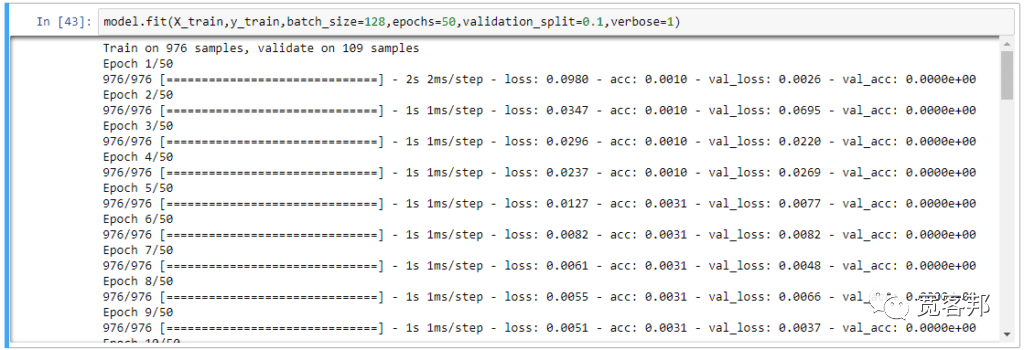
在经过一段时间的训练过程后,我们便能得到 LSTM
模型(model)。接着再用这个模型对测试数据进行预测,以及将预测出来的数值(pred)与实际股价(y_test)还原回原始股价的大小区间:
LSTM 模型预测股价及还原数值
defdenormalize(df, norm_value):
original_value = df['close'].values.reshape(-1,1)
norm_value = norm_value.reshape(-1,1)
min_max_scaler = preprocessing.MinMaxScaler()
min_max_scaler.fit_transform(original_value)
denorm_value = min_max_scaler.inverse_transform(norm_value)return denorm_value
# 用训练好的 LSTM 模型对测试数据集进行预测
pred = model.predict(X_test)# 将预测值与实际股价还原回原来的区间值
denorm_pred = denormalize(foxconndf, pred)
denorm_ytest = denormalize(foxconndf, y_test)
5 LSTM 预测股价结果
让我们把还原后的数值与实际股价画出来,看看效果如何:
LSTM 预测股价结果
import matplotlib.pyplot as plt
%matplotlib inline
plt.plot(denorm_pred,color='red', label='Prediction')
plt.plot(denorm_ytest,color='blue', label='Answer')
plt.legend(loc='best')
plt.show()
如下图,蓝线是实际股价、红线是预测股价。虽然整体看起来预测股价与实际股价有类似的走势,但仔细一看预测股价都比实际股价落后了几天。
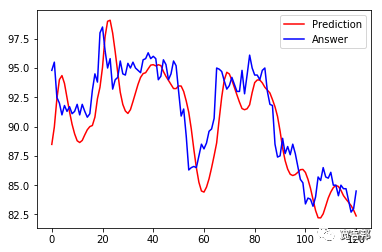
所以我们来调整一些设定:
- 时间框架长度的调整
- Keras 模型里全连结层的 activation 与 optimizaer 的调整
- Keras 模型用不同的神经网路(种类、顺序、数量)来组合
batch_size的调整、epochs的调整 …
经过我们对上述的几个参数稍微调整过后,我们就得到一个更贴近实际股价的预测结果啦。
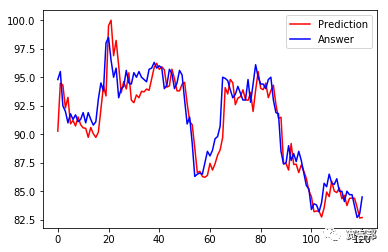
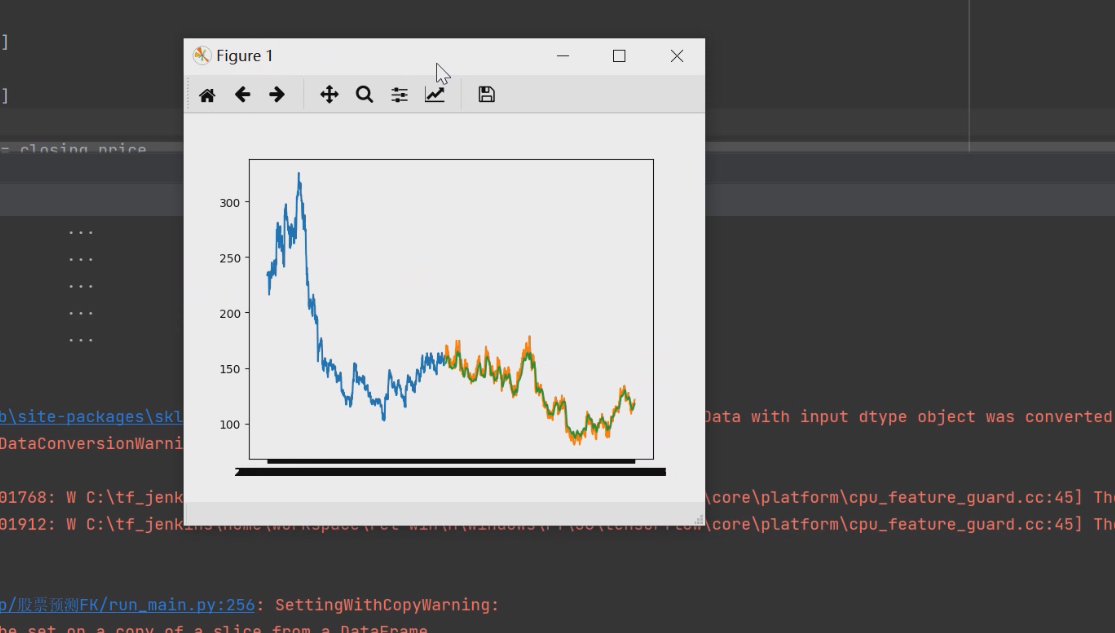
6 完整工程项目
项目分享:
版权归原作者 A毕设分享家 所有, 如有侵权,请联系我们删除。